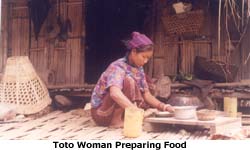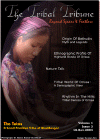|
The Totos are the smallest tribal group and one of the three Primitive Tribal Groups of West Bengal. They are concentrated in the village of Totopara in Madarihat Police Station under Alipurduar Sub-Division of Jalpaiguri District. This village being very close to the Himalayas experiences a humid and cold climate. Due to deforestation and mining in recent years, a marked change in the climate has been observed.
Totos are divided into 13 clans. The name of clans are as follows : Baudhbei, Badubei, Linkajibei, Nurun-changobei, Dhirenchangobei, Nubebei, Bangobei, Dantrobei, Mantrobei, Dankobei, Mankobei, Manchingbei, Pisochangobei. Different clans have different ancestral deities and they have different taboos.
The Totos have a dialect of their own. Different authorities (Hodgson, Grierson etc.) have classified this dialect under Tibeto-Burman family of Sub-Himalayan group.
|
Most of the Toto families are having only one hut with one room. The huts are built a wooden or bamboo posts; about 6 ft. above the ground and the roof is thatched with straw locally known as "Khiri". The floor is made of split bamboo; the roof having two slopes and the wall is made of crude bamboo mats. There is no parlour in any house. The Stair from ground to verandah is made of tree trunk or thick pieces of wooden plank.
As they have only one room in their house, they use a part of it for sleeping purpose, another part for cooking purpose. The ground below the floor is strongly fencing from all sides and within this covered area they keep their animals and poultry i.e. ducks, hens, pigs, cows etc. and in other part they keep their cereals within wooden structures.
|
 |
 |
Maize is their staple food; in addition to it they take Kauni and Marua. They usually take different roots and tubers. The flesh of Cow, Buffalo, Pig, Fowl, Pigeon, Deer etc. are frequently taken by them. Eu, a country made liquor, is their favourite drink. They make liquor by fermenting rice, maize, marua and Kauni.
|
In the year 2004, the total population of this village is 4892, out of which 1258 persons belong to Toto community. There are six other communities who have settled thereby encroaching upon the land of the Totos. In all there are 997 families in Totopara, of which 260 households belong to the Toto.
The Totos were exposed to formal education only in the mid fifties. After 1979, a marked progress has been noted, mainly due to the functioning of the Primary Schools in the village. The number of literate persons is 324 (33.33%),comprising of 215 male and 109 female.
In past, Totos were mainly food gatherers and practiced slashes and burn type, of cultivation. Along with this, the Toto families earn a good amount of money by working as porters for carrying oranges from the different gardens of Bhutan to Totopara. With the passage of time, occupational diversification has taken place. At present they became settled agriculturist.
Out of a total population (1258), 55.14 percent (638) are earners and maioritv of them are working in the field of agriculture either as cultivator (22.10%) or as, Agriculture labourer (41.22%).

There are 10 Totos now employed in different Government and Semi-Government Services and 15 Totos are engaged in small business within the village. Economically the Totos are very poor and they depend on forest produces to a great extent.
It has been observed that due to various development activities in the area raising demand for labour their income has raised to a great extent but the expenditure level has also gone up. As a result, families living below the poverty line are not in a position to come out from the vicious cycle of poverty. They are compelled to take loan from others and remain indebted for years together.
Here it may also be mentioned that addiction to country liquor and alcohol are also responsible for their high expenditure and indebtedness. Live stock population of the Toto house holds mainly consist of cow, bullock, goat, sheep, pig and country birds.
The first criteria of marital alliance are clan exogamy. Senior sororate (marrying wife's elder sister) is not allowed by polygamy (multiple marriage) and levirate (marrying husband's brother) is permitted. Monogamy is the rule. They have two phases of marriage. One is 'Bagdan' (betrothal) which is held at the time when the girls becomes adult. In this type, the girl is allowed to go to her beloved 's house after attaining the puberty and they live there as husband and wife. This ritual is called 'Namalamee'. And when the girl becomes pregnant after 5 to 9 months the second phase of marriage takes place and a community feast has been arranged.
Now-a-days, the social marriage takes place before the pregnancy.

During pregnancy they perform some magical rites by sacrificing pig and fowl. To remove the evil spirits at the time of delivery they consult 'Pau' - a traditional Priest. An experienced women attend the delivery case as midwife.
First rice feeding ceremony of a baby is held at the age of 5 years. Rice and other foods are first offered to their deity 'Mahakal' and then that rice is offered to the child.
They believe that death occurs due to some disease and the disease is caused by the evil spirit. Evil spirits are propitiated by offering the fowls or pigs. They bury the dead body in the bed of Torsa river. The dead body is smeared with oil before laying on eternal bed. A piece of bamboo is given to the deceased husband or wife and he or she has to keep that bamboo for a year. But now the period is reduced to twelve days instead of twelve months.
The family members of the deceased are prohibited from taking food or drink from others during the mourning period. The house is purified on the day of the community feast. Food is served to them on the 5th day in case of female and 6th day in case of male. This ritual is called as 'Pang-Sand-Pame'. Senior clan members offer prayer.
The Chief deity of the Totos is MahakaL. Worship, propitiation and sacrifices are held to appease the spirits. There are two sacred drums (Bakung] which are preserved in their sacred house (Demsha) for their annual worship. Of these two drums one is male (Mahakal) and the other is female (Mahakali).
Each family have their family deity 'Chima', which is worshipped every day. Totos have a village council to deal with the various problems. The post of the village priest is 'Kaji' and the secular chief is 'Mondal'.
|







